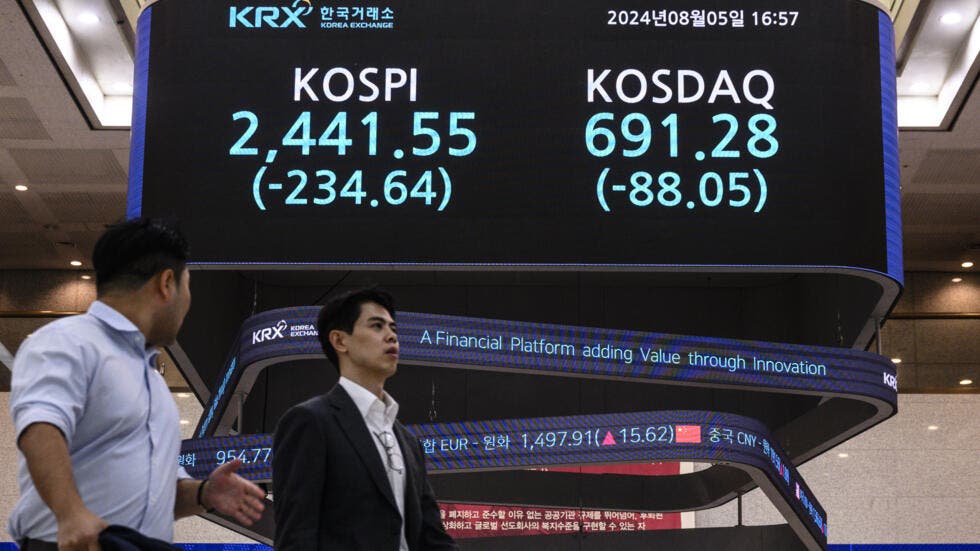In Europe, major stock markets opened lower, weighed down mainly by banking and technology stocks, following the falls recorded hours earlier in Asia.
Frankfurt lost more than 3% shortly after the opening, Paris fell 2.6% and London 2.3%. Madrid dropped 2.8% and Milan plummeted 4%.
“The trigger: a US jobs report” released on Friday, which sent “stocks and bond yields” tumbling on Wall Street, explained Stephen Innes, an analyst at SPI Asset Management.
The US unemployment rate rose more than expected in July to 4.3%. It is the highest unemployment rate in the country since October 2021.
Following this publication, government bond yields fell sharply, suggesting that the US Federal Reserve (Fed) could cut its rates more drastically than expected.
If the Fed “makes its first rate cut of 50 basis points” in September, instead of the 25 basis points expected by the market, “it will be its way of admitting” that it has taken too long to ease monetary policy, Innes believes.
Deutsche Bank analysts, meanwhile, point out that the magnitude of market anticipation of the number of Fed rate cuts “over the next 12 months has only been seen during a recession.”
In the debt market, US yields, which move in the opposite direction to bond prices, continued to fall, reaching 3.76% at 07:25 GMT, compared with 3.79% for 10-year bonds on Friday, reflecting investors’ interest in safer securities than stocks, which are considered a risky asset.
Asian crashes
The decline in Asian stock markets was much more pronounced.

Tokyo plunged. The Nikkei 225, its main index, which had already fallen 5.8% on Friday, lost 12.4%, or 4,451.28 points, on Monday to close at 31,458.42 points, breaking its record for losses dating back to the stock market crash of October 1987.
The broader Topix index fell 12.23 percent to 2,227.15 points.
Taiwan fell by more than 8% and Seoul by more than 9%. Chinese stock markets fell more moderately: Hong Kong’s Hang Seng index lost 2.13% in late trading.
The Shanghai Composite Index fell 1.54% and the Shenzhen Composite Index fell 1.85%.
“The immediate trigger for this risk aversion appears to be the unexpected interest rate hike” announced by the Bank of Japan on Wednesday, according to Dilin Wu, a strategist at Pepperstone.
This monetary tightening after years of negative interest rates, combined with a slowdown in economic activity in the United States, precipitated the rise of the yen, which was also supported by the interventions of the Japanese central bank in the foreign exchange market.
The Japanese currency, which was trading at almost 162 yen per dollar in July, rebounded on Monday to 141.73 yen per dollar, a level not seen since early January, from 146.52 yen recorded on Friday in New York.
A stronger yen is a negative factor for Japanese exporters.
On the foreign exchange market, the dollar fell 2.17% to 143.35 yen on Monday, while the euro fell 1.99% to 156.72 yen.
Bitcoin fell 11.70% to $52,217.
















